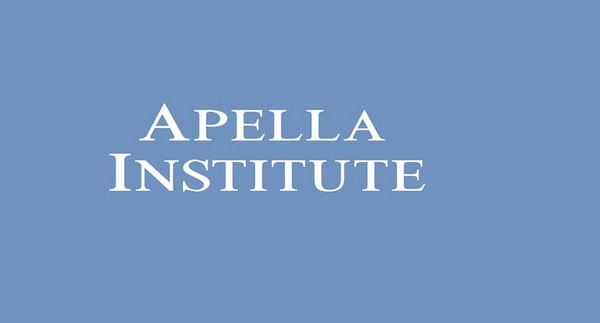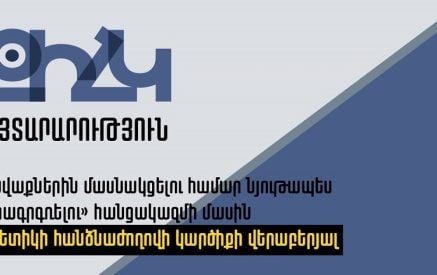WHAT ARE THE MAIN CHANGES AND HOW THEY WILL AFFECT POLITICAL INSTITUTIONS AND DEMOCRATIC DEVELOPMENT?
EXECUTIVE SUMMARY
On December 6, 2015, Armenia will hold a referendum to decide on the proposed changes to the Constitution. Constitutional reforms were initiated by President Sargsyan in September 2013 absent any public demand and without prior consultations with the opposition and the civil society. Although the Constitutional Commission was mostly composed of delegates from the ruling party and the government and none from the opposition, several rounds of public discussions and consultations were held with political parties and non-governmental organizations between March 2014 and October 2015. The Venice Commission of the Council of Europe has delivered six opinions on different editions of the concept paper and the draft constitution. While the Venice Commission engaged with the Constitutional Commission on regular basis, it was criticized by the civil society for a failure to consult with non-governmental organizations in a similarly regular and meaningful manner.
Read also
The constitutional reform intends a fundamental change of the government system based on a transition to a parliamentary model with strong majoritarian institutions and weak power-sharing arrangements. The suggested system will effectively promote government stability and may give stronger impetus for consolidation of political parties, but at the same time, will evidently weaken the promise of consensual governance and will result in further concentration of power and erosion of intern-institutional accountability and the checks and balances between the government agencies. The majority of experts fear emergence of unrestrained majoritarianism as an outcome, while a considerable number of domestic experts believe that legitimization of a revived Soviet-style “partocratic” governance will be among the most expected macro-political effects of these reforms. The prospect of democratic development will be further weakened by a more limited space given to democratic participation and mobilization due to shrinking role of electoral practices, caused by elimination of presidential elections and extension of the term of elected self-government bodies. Lower number of elections may perpetuate fusion of the state and the business interests and hence the corrupt electoral practices.
The proposed changes in the human rights section attempt an extensive revision of the entire catalogue of rights as provided by the Constitution. While a number of changes with respect to human rights constitute improvements, some others, mostly related to social and economic rights, clearly lower the standards of protection as provided by the current Constitution. Certain changes in the mode of appointment and removal of judges, as well as the tenure of judges may have positive effect on the independence of the judiciary, but they are unlikely to affect the current unsatisfactory status of judicial independence in any significant way. Contrary to the long-standing demands of human rights organizations, the political opposition, and the Venice Commission, the constitutional changes do not provide for any changes that would help overcoming the profound public distrust in the integrity of the electoral process.
I. INTRODUCTION
1. The Reform Process
Following the decree of the President of the Republic of Armenia of October 8, 2015, a constitutional referendum will be held on December 6, 2015. According to the current Constitution (art. 113), the adoption of the changes will require the approval of at least twenty five per cent of the eligible voters. Since the reforms began in 2013, the Venice Commission has delivered six opinions on different editions of the concept paper and the draft constitution.
The reforms were initiated by President Sargsyan in September 2013, and an ad-hoc commission (Constitutional Commission), composed mostly of representatives of the government and the ruling party and chaired by the President of the Constitutional Court, was formed on September 4, 2013. The Commission published the first concept paper on constitutional reforms in March 2014. After a series of intensive, though largely formal, consultations with political parties and non-governmental organizations, as well as with the Venice Commission of the Council of Europe (Venice Commission), the Constitutional Commission issued a draft of constitutional amendments in July 2015. Further consultations on this draft were held in the National Assembly and with the representative of the Venice Commission in August– October 2015. The final version of amendments was endorsed by the National Assembly on October 5, 2015.
Since the reforms began in 2013, the Venice Commission has delivered six opinions on different editions of the concept paper and the draft constitution. Despite a number of concerns that it has consistently raised, the Venice Commission has largely welcomed the reforms, commending the quality of the work done by the Constitutional Commission. While it engaged with the Constitutional Commission on a regular basis, the Venice Commission was criticized by the civil society in Armenia for the failure to consult with non-governmental organizations in a similarly regular and meaningful manner. As a result, there have been common concerns among the civil society that the Venice Commission’s opinions have in some respects lacked local knowledge and necessary awareness of the nature of political processes in the country.
2. Methodology and Acknowledgements
This assessment is undertaken by the team of Apella Institute’s analysts following a series of discussions, consultations, and debates with and among domestic and international experts, scholars, legal practitioners, and members of the civil society in the framework of its Constitutional Awareness Project.[1] As part of the Project, a number of Armenian and foreign experts and academics were also interviewed on the implications of constitutional reforms by leading Armenian online media. Earlier in 2014, a survey was conducted among leading domestic experts and practitioners that summarized median attitudes by independent professionals towards the March 2014 Concept Paper on constitutional reforms.[2]
Apella Institute would like to thank the experts who participated in the consultative discussions, events and interviews as described above.[3] While this assessment has drawn utmost inspiration from these experts’ analysis, the particular conclusions of this report do not necessarily coincide with the opinions by individual experts. We would also like to thank the members of the Constitutional Commission for taking part in some of the above-mentioned events.[4] Apella is grateful to the US Embassy in Armenia for supporting the last (2015) phase of the Constitutional Awareness Project and writing of this report, and to the Open Society Foundations-Armenia for supporting its early (2014) phase. We appreciate the support of the OSCE Office in Armenia in funding the three round-tables organized in 2015 and we are indebted to our media partners, Civilnet, Azatutuyn (Radio Liberty), and Media Center for covering our events and hosting the interviews and debates. This report and any views and opinions found in it are those of Apella Institute and do not necessarily express the opinions and positions of its individual partners, interlocutors and sponsors. While the Constitutional Awareness Project was funded through a Department of State Public Affairs Section grant, the opinions, findings and conclusions or recommendations expressed herein are those of the authors and do not necessarily reflect those of the Department of State.
II. HUMAN RIGHTS
The proposed constitutional changes attempt an extensive revision of the entire catalogue of rights as provided by the Constitution. The revision of the rights sections is marked by a keen, and somewhere mechanical, borrowing from the major European human rights documents, such as the European Convention on Human Rights (ECHR) and the EU Charter of Fundamental Rights, as well as from the jurisprudence of the European Court of Human Rights (ECtHR). While alignment with the European human rights law is a welcome tendency, literal incorporation and detailed prescription of the ECtHR case-law, which is a constantly developing body of law, may result in entrenchment of incorporated standards and prevent their further evolvement through time. At the same time, legal transplantation from the European human rights law in a number of cases lowered rather than raised the standards of human rights protection as provided by the current Constitution. [5]
An earlier draft of constitutional changes, in fact, provided for a number of new editions of rights where the standards of protection were evidently lower than those in the current Constitution, even though the changes were in line with the European Convention. The most controversial amendments, dropping the current constitutional standards, included the new edition of property rights following which one could be deprived of property without a judicial sanction, as well as the new edition of the presumption of innocence in which, similarly, the requirement of judicial pronouncement was omitted. A new wording for the prohibition of the retrospective effect of legal acts was also proposed that was treated skeptically by practitioners and rights activists as it could enable open-ended interpretations leading to retrospective application of law. In a positive development, the Constitutional Commission, under the pressure from the critiques of these provisions, restored the existing wordings in all the above-mentioned cases.[6]
The proposed text, however, still contains a number of rights provisions which deviate from the superior standards of the current Constitution. Social and economic rights have undergone significant changes, and the proposed draft in many cases abandons the positive obligations of the state as guaranteed by the current Constitution. For example, while the current Constitution guarantees the right to live in an environment favorable to his or her health and welfare (art. 33.2) and the right to an adequate standard of living (containing the right to housing and to improvement living conditions (art. 34), matching these rights with respective obligations of the state, in the proposed constitution the state only obliges to promote the preservation of environment (art. 12) and foster housing construction (art. 86), but does not carry an obligation to ensure the realization of these rights. Other social and economic rights, including the right to adequate working conditions (art. 82), social security (art. 83), and health care (art. 85) have been granted a lower constitutional status than by the current Constitution.
Despite the persistent recommendations of the Venice Commission, as well as of the OSCE, the constitutional reform does not address disenfranchisement of dual citizens and continues to provide for disproportionate restrictions on the right to stand based on residency requirements.[7] Contrary to the long-standing demands of human rights advocacy organizations and the political opposition in Armenia, constitutional changes do not also provide for the publication of signed voters’ lists that was widely considered as a necessary starting point for overcoming the profound public distrust in the integrity of the electoral process.[8]
A number of changes in the human rights sections, on the other hand, constitute improvements. The catalogue of rights is extended with a list of new items, including the right to physical and mental integrity (art. 24), gender equality (art. 30), rights of a child (art. 37), the right to alternative military service (41), and the right to proper administration (art. 50). Changes that were especially welcomed by the experts include constitutional stipulation of the principles of proportionality (art. 78) and legal certainty (art. 79), though many opponents have contended that the wording of the principle of proportionality fails to incorporate the element of “necessity in a democratic society”.
III. GOVERNMENT AND ELECTORAL SYSTEM
The constitutional reform intends a fundamental reshuffle of the government system based on a transition from a semi-presidential to a parliamentary form of government. The proposed government form will provide for a limited and largely ceremonial president and a strong Westminster-style cabinet executive.[9] The National Assembly (the Parliament) will be elected for a five-year term in proportional only elections and the President will be elected by the National Assembly for a single seven-year term.[10] While the proportional electoral system is commonly associated with a multi-party political framework and inter-party coalitions, borrowing of Italy’s most recent electoral law (the Italicum), that has been expressly advocated by the Constitutional Commission and is given a green light by the draft constitution, will in a long-run promote a bi-polar political setting with limited space for consensual governance and inter-party coalitions.[11] The proposed changes, as described above, will have a considerable effect on political developments and democratic institutions.
The suggested model of government formation and the electoral system will effectively promote government stability and can prevent the situations of “gridlock and deadlock” typical to semi-presidential systems in the time of cohabitation.[12] Considerations of stability are rated high in the country still facing an imminent threat of war and multiple geopolitical challenges. Despite this, as the proposed constitutional solutions for government stability especially rely on “the winner takes all” logic and considering the deficit of deliberative and participatory democracy in the country, the proposed government system may enforce further societal polarization and can therefore cause major political crises.
At the same time, the changes seeking government stability will evidently weaken the promise of power-sharing as vested with semi-presidentialism and with the current parliamentary settings. The degradation of power-sharing arrangements will necessarily result in erosion of the existing mechanisms of intern-institutional (horizontal) accountability and will weaken checks and balances between the government agencies. The majority of experts feared emergence of unrestrained majoritarianism as an outcome, while a considerable number of domestic experts believed that legitimization of a revived Soviet-style “partocratic” governance would be among the most expected macro-political effects of these reforms.
Most of the experts also expect that the transition to the parliamentary form of government will give stronger impetus for consolidation of political parties and institutionalization of the party system. This is largely seen as a desired development, as Armenia’s party system has traditionally been fragmented and not any but one, the ruling Republican party, has ever emerged as a competitive political association able to assume the responsibilities for governing the country. Many experts have noted, however, that the fragmented party system was not so much due to semi-presidentialims as it was due to the political constraints faced by opposition parties on their way to consolidation.[13]
Ultimately, the proposed change of government form will have intended, as well as unintended effects on consolidation of democratic institutions. The institutions of majoritarian democracy, strongly promoted by the changes, may undermine the prospect for political dialogue between different parties and social groups while strengthening the prospects for consolidation of one-party dominated majoritarian rule. The extension of the list of legislation which is now to be adopted in the National Assembly by 3/5 of the votes, including the so-called “organic laws”, is a welcome improvement giving the parliamentary minority groups a chance to veto a limited number of decisions that are now passed by simple majorities, but is not able to compensate for the principally ceremonial role granted to the political opposition under the proposed government model.
The prospect of democratic development will be further weakened by a more limited space given to democratic participation and mobilization due to shrinking of the role of electoral practices in consolidation of democratic institutions and political competition, caused by elimination of presidential elections and extension of the term of elected self-government bodies.[14] As believed by local political economists, the lower number of elections, resulting in considerable reduction of the cost for reproduction of the incumbent elites both at the national and local levels, will also provide for further economic incentives for the so-called oligarchs and will hence perpetuate the fusion of the state and the business interests and the corrupt electoral practices.
IV. THE JUDICIARY
Unlike the political branches, the judiciary in the proposed constitution is not subject to any restructuring. The current three-tier structure of the judiciary, comprising general courts as the first tier, appellate courts as the second, and the Cassation and Constitutional Courts at the top, is not changed in the proposed constitution, though introduction of a two-tier judiciary was among the propositions of March 2014 constitutional concept paper. Instead, the draft constitution provides for a number of changes related to the composition and tenure of the judges.
Judges in the first and second tiers will be appointed by the President of the Republic, upon the recommendation by the Supreme Judicial Council. Judges of the Cassation Court will also be appointed by the President, but by the recommendation of the National Assembly. The Judicial Council will be composed of five members (judges), appointed by the general assembly of judges, and five other members elected by the National Assembly. The draft constitution also provides that judges cannot be held liable for expressing an opinion or pronouncing a judgment. Although these changes in the mode of appointment and removal of judges, as well as the tenure of judges may have certain positive effect on the independence of the judiciary, they are unlikely to affect the current status of judicial independence in any significant way.
Constitutional judges, as well as the candidates for Cassation Court judges, will be elected by the National Assembly by the votes of at least three-fifth of its members.[15] The same procedure will apply to the election of the Prosecutor General.[16] This is a largely welcome change as it gives the parliamentary opposition leverage in the appointment of higher judges and the Prosecutor General. At the same time, these procedures may potentially result in partisan bargaining over judicial appointments and hence unnecessary politicization of the judicial office. It is also not clear what mechanisms are provided against possible deadlocks during parliamentary approvals of these positions, for example if the parliament consistently fails to secure a necessary majority of the three-fifth for the appointment of the higher judges or the Prosecutor.
The draft constitution fails to confer upon the Constitutional Court an obligation to invalidate elections in case they are held in a manner that is considered unconstitutional. Instead, both the current and the proposed constitutions contain ambiguous wording granting the Court a power to “decide on conflicts” arising from elections.[17] In its most recent jurisprudence, the Constitutional Court of Armenia had delivered a narrow interpretation of this provision, resulting in abstention from taking on responsibility for invalidation of elections as a matter of law. The draft constitution’s reproduction of the existing wording will continuously fail to activate the constitutional court as an agent of democracy and electoral integrity, even though granting of the power “to cancel a parliamentary or presidential mandate or a general election” was urged, among others, by the Venice Commission.[18]
APELLA INSTITUTE
for Policy Analysis and Dialogue
[1] A series of conferences, round-tables and seminars were held between June 2014 and October 2015, serving as a platform for debating the proposed changes. Public events included the international conference of July 4, 2014, and round-table discussions held on August 26, October 6 and November 6 of 2015 respectively.
[2] Available, in Armenian, at https://acrrc.apellainstitute.org/wp-content/uploads/2015/11/experts-about-the-constitutional-reform-report.pdf.
[3] We are grateful to Mr. Hayk Alumyan (Chamber of Advocates), Dr. Vardan Baghdasaryan (American University of Armenia), Dr. Fernando Casal Bertoa (University of Nothingam), Mr. Hamazasp Danielyan (Institute of Public Policy), Mr. Levon Gevorgyan (Chamber of Advocates), Mr. Ara Ghazaryan (Chamber of Advocates), Mr. Richard Giragosian (Regional Studies Center), Mr. Vahe Grigoryan (European Human Rights Advocacy Centre), Ms. Haykuhi Harutuynyan (Protection of Rights Without Borders), Mr. Varuzhan Hoktanyan (Transparency International-Armenia), Mr. Avetik Ishkhanyan (Armenian Helsinki Committee), Mr. Ashot Khurshudyan (International Center for Human Development), Dr. Aleksand Markarov (Yerevan State University), Ms. Araks Melkonyan (Chamber of Advocates), Dr. Aliaksei Pikulik (Belarusian Institute for Strategic Studies), Dr. Marta Regalia (Electoral Integrity Project), Mr. Artur Sakunts (Helsinki Citizens Assembly-Vanadzor), Dr. Daniel Smilov (University of Sofia), Ms. Heriknaz Tigranyan (Transparency International- Armenia), Dr. Miroslaw Wyrzykowski (University of Warsaw).
[4] We especially thank Mr. Gevorg Danielyan, Mr. Gagik Ghazinyan, Mr. Davit Harutyunyan, Mr. Gagik Harutyunyan, Mr. Grigor Muradyan, and Mr. Vardan Poghosyan for attending the events and/or taking part in the debates organized by Apella Institute.
[5] The 1995 Constitution of Armenia, reformed in 2005, contains an advanced catalogue of written rights and in many cases prescribes higher standards for human rights protection than those in the European Convention of 1950.
[6] Concerns were also raised about the new edition of freedom of assembly, as its requirement for a prior notification did not envisage spontaneous gatherings: in response to this critique, the Constitutional Commission edited the provision which now stipulates that spontaneous gatherings can be held without prior notices.
[7] Article 48 of the draft Constitution states that only a citizen of Armenia, who resided in the Republic of Armenia for the past four years, has the right to be elected to the parliament whereas the Venice Commission’s Code of Good Practice in Electoral Matters recommends that a “length of residence requirement may be imposed on nationals solely for local or regional elections” and that “the requisite period of residence should not exceed six months”.
[8] Many domestic election observing groups and other non-governmental organizations, including Transparency International Anticorruption Center, repeatedly called for amending the electoral code to allow for the publication of signed voters’ list as a necessary step to prevent multiple voting and for increasing the confidence in the electoral process. See Transparency International Anticorruption Center’s “Opinion on the non-compliance of the initiated constitutional referendum with the international standards,” available at https://transparency.am/en/news/view/1086.
[9] While in office, the President cannot be a member of a political party.
[10] Currently the Parliament is elected for a five-year term in a mixed proportional-majoritarian election, and the President is elected for a five-year term directly by the people.
[11] The most prominent features of the Italicum, the majority bonus and the run-off between the two winners, are enabled but not prescribed by article 89 of the proposed constitution which refers to the Electoral Code for stipulating the specific configuration of the electoral system. The Constitutional Commission’s long-term intention to transplant the Italicum into Armenia’s Electoral Code has been confirmed by its members in several interviews and is also referred to by the Venice Commission: see First Opinion on Draft Amendments to the Constitution, paragraph 79, p. 14, https://www.venice.coe.int/webforms/documents/default.aspx?pdffile=CDL-AD(2015)037-e.
[12] While government instability has not been typical to Armenia’s semi-presidential governance previously, the concept paper on constitutional reforms has viewed emergence of possible cohabitation of a president and a parliamentary majority belonging to opposing political parties as one of the major causes of instability and hence as a threat that has to be addressed by constitutional reforms.
[13] In February 2015, the emerging alliance between the main opposition parties, that was believed to pose a challenge to the incumbent Republic party’s dominance, was destroyed as a result of the campaign of state-sponsored harassment against the leader of one of these parties, Prosperous Armenia.
[14] Following constitutional changes, local elections will be held once during a five-year period; currently they take place once every four years.
[15] The tenure of constitutional judges will be limited to one non-renewable 12-year term, while the other judges will serve without limits until the age of sixty five.
[16] The Prosecutor General is to be elected for six years and can serve for not more than two consecutive terms.
[17] Articles 100 (3.1) and 168 (5) respectively.
[18] See the Venice Commission’s Second Opinion on the Draft Amendments to the Constitution, paragraph 51, p. 9: https://www.venice.coe.int/webforms/documents/?pdf=CDL-AD(2015)038-e.


























































